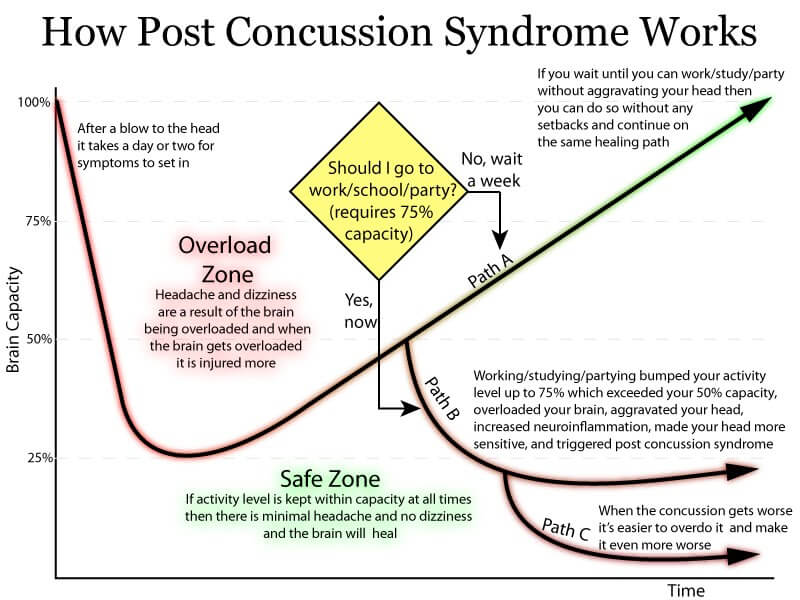Post-Concussion Syndrome (PCS) can occur with any kind of a head injury. One of the most frequent occurrences is after an automotive accident. The level of intensity is not necessarily proportional to the severity of the trauma. A relatively minor bump on the head can cause significant symptoms. Essentially, post-concussion syndrome is a mild form of traumatic brain injury (TBI).
Post-concussion symptoms can include:
- Dizziness
- Headaches (including migraines)
- Inability to concentrate
- Anxiety or depression
- Loss of memory
- Fatigue
- Irritability
- Frustration not being able to perform normally
- Insomnia
- Blurry vision
- Neck pain
- Sensitivity to light and noise
- Balance and coordination problems
- Other emotional coping issues
How is post-concussion syndrome diagnosed?
Primarily by the signs and symptoms mentioned above, testing for deficits in balance and coordination, and a cognitive survey called a Glasgow scale. MRI and CT scan generally cannot assess injury, which can be frustrating for some patients. Females and young people are at a higher risk for PCS, as are those who have already experienced three or more concussions. Other risk factors are preexisting conditions such as migraines, memory issues, neurological issues such as Epilepsy and learning disabilities. If the symptoms of the concussion do not resolve in the usual time frame anticipated, a health care provider may make a diagnosis of post-concussion syndrome.
How long does it last?
This can be one of the more disconcerting aspects of PCS. It can last a few weeks, a few months, or a year or more. Though some of the symptoms may resolve relatively quickly, it’s common for patients to have residual problems for a long time.

After a concussion, the brain often has difficulty interpreting information from the inner ear (the vestibular system), which is one of the major organs that maintain our balance and spatial orientation. If this system is not working correctly, a person may experience dizziness, double or abnormal vision in addition to nausea and vomiting. In these instances, a physical therapist trained in treating PCS works with the patient to improve vestibular function.
What are my treatment options?
Time and rest are essential to treating PCS. As you can imagine, this can be difficult for most patients who maintain a demanding work schedule. Time off of work can contribute to not just physical discomfort, but emotional and mental distress as well. Physical Therapy for can help restore balance and coordination. Chiropractic care has shown to improve alignment and removing pressure on the nerves, as well as massage therapy to relax muscle spasm and tension. Occasionally, psychological and medical (medications) are indicated
If you or someone you know are suffering from PCS, had a recent accident or experiencing the symptoms listed above, please contact us. We offer Complimentary Consultations from 8am – 5pm, Monday- Friday (Tuesdays until 2pm)!


